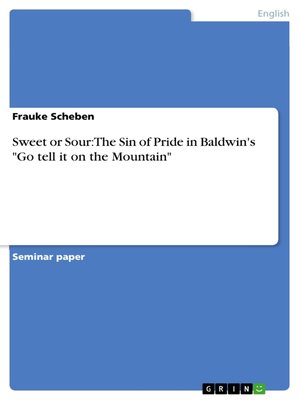
Sign up to save your library
With an OverDrive account, you can save your favorite libraries for at-a-glance information about availability. Find out more about OverDrive accounts.
Find this title in Libby, the library reading app by OverDrive.



Search for a digital library with this title
Title found at these libraries:
| Loading... |
Seminar paper from the year 2003 in the subject American Studies - Literature, grade: 1, University of South Carolina, course: 20th Century African American Literature, language: English, abstract: "Hatred of God comes from pride. It is contrary to the love of God ." I chose
this particular assertion of the Catholic Church because it serves adequately as an introduction to my following argument. If this statement holds true, what can one make of Gabriel's attitude in James Baldwin's novel Go tell it on the Mountain? Gabriel – although he himself believes he has a clean conscience before God – has sinned. His sin is pride, which is one of the
seven cardinal sins. In his own opinion, Gabriel has become clean before God, he has been forgiven for his sins (215). He goes even further when he says that he considers himself to be the Lord's anointed. How can he be so sure?
In my paper I will try to mainly discuss Gabriel's, John's, and Elizabeth's proud emotions. I will show what it is they are proud of and what they have and do not have in common. Furthermore, I will cover some of the biblical symbolism in Baldwin's novel and question whether all pride is necessarily sinful or if there are reasonable justifications. In any respect, Gabriel is very judgmental. He judges people around him, for instance his sister Florence when he says, "...she so proud the Lord going to bring her low one day..." or Esther, for whom he eventually loses all respect (125). Furthermore,
he chooses to go the easy way when he has helpful explanations handy in any situation. When his son Roy gets stabbed by white people, it – of course – is the white people's fault: "This is what white folks does to niggers..." Roy's behavior is explained by the fact that he has to suffer for the sins his mother has committed in the past (111). When Gabriel has an affair with Esther - according to Gabriel - he cannot be blamed for committing adultery. After all, Gabriel assumed that Satan tempted him to fall (130). By saying that, Gabriel gives away all responsibility for his own actions. In his own
accord, he is merely a "poor, weak vessel in the hands of the Lord." [...]






